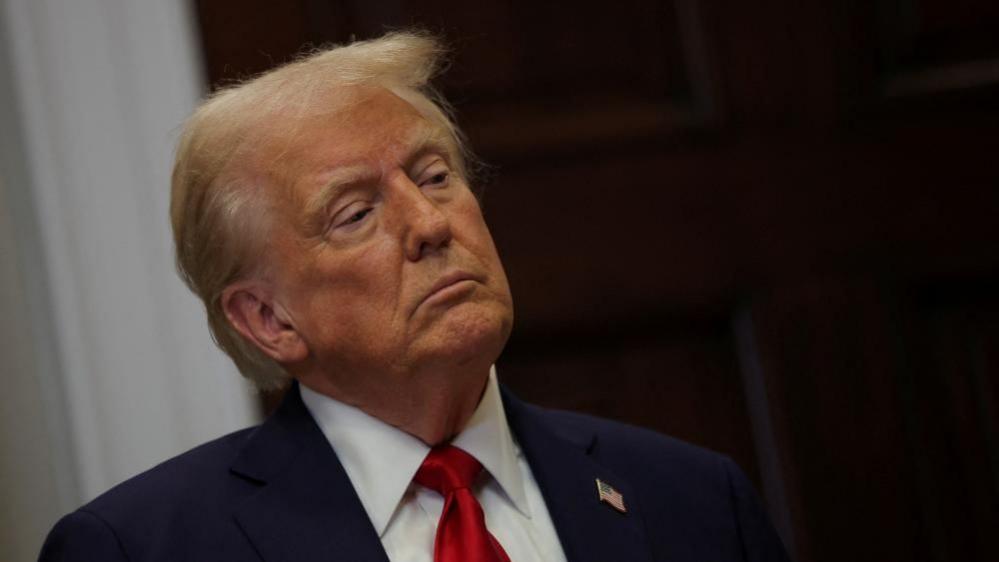Trump AI plan aims to cut red tape and 'partisan bias'

- Published
President Donald Trump's administration has unveiled a plan to maintain America's edge in artificial intelligence by sweeping aside regulatory hurdles while seeking to rid such programs of "partisan bias".
The AI Action Plan outlines more than 90 policy actions for the rapidly developing technology that the administration says can be implemented over the next year.
"We believe we're in an AI race, and we want the United States to win that race," Trump administration crypto tsar David Sacks told reporters.
The AI plan promises to build data centre infrastructure while also eradicating "ideological bias", but critics said it was a giveaway to Big Tech.
The 28-page plan also calls for federal agencies to review and repeal policies that stand in the way of AI development, and encourage AI in both government and the private sector.
Trump signed three executive orders related to AI, after attacking critics in a keynote speech at a summit on Wednesday held by hosts of the All-In podcast.
"The American people do not want woke Marxist lunacy in the AI models," Trump said in the speech.
One of the executive orders Trump signed aims to root out what the administration deems ideologically biased AI systems, while another promotes the international export of US-developed AI technologies.
"With the right government policies, the United States can solidify its position as the leader in AI and secure a brighter future for all Americans," the White House said earlier on Wednesday.
The White House's crypto tsar added that the plan was partially focused on preventing AI technology from being "misused or stolen by malicious actors" and will "monitor for emerging and unforeseen risks from AI".
The Trump administration has positioned the expansion of AI infrastructure and investments in the US as a way to stay ahead of China.
"AI is a revolutionary technology that's going to have profound ramifications for both the economy and national security," Sacks said. "It's just very important that America continues to be the dominant power in AI."
But critics argued that the plan removed important oversight and safeguards at the behest of Big Tech.
"The White House AI Action plan was written by and for tech billionaires, and will not serve the interests of the broader public," said Sarah Myers West, co-executive director of the AI Now Institute.
"[T]he administration's stance prioritizes corporate interests over the needs of everyday people who are all already being affected by AI," West added.
In 2023, Trump's predecessor, Joe Biden, signed an executive order that called for safety and security standards governing the use of AI in the federal government - an order that was rescinded by Trump on the first day he took office in January.
Days later, Trump signed an executive order that called for an accelerated AI development, the removal of ideological bias and today's AI action plan, for which it sought public comment.
Officials say the plan unveiled on Wednesday was shaped by more than 10,000 public comments.
A former Biden administration official told the BBC that Trump's plan had abandoned safeguards that helped protect American national security and public trust.
"Accelerating innovation is essential, but dismantling responsible guardrails risks turning America's AI revolution into a reckless gamble," said Jim Secreto, former Deputy Chief of Staff to Biden's Commerce Secretary Gina Raimondo.
"Promoting aggressive AI exports without reasonable controls strengthens China's hand," Secreto added.
Last month, Trump allowed US technology giant Nvidia to resume sales of its high-end artificial intelligence (AI) chips to China, reversing his administration's ban on sales of Nvidia's H20 chips to Beijing.
AI regulation was also a major sticking point in recent negotiations about Trump's massive budget bill passed by Congress earlier this month.
The bill originally included a 10-year moratorium barring states from regulating artificial intelligence.
Lawmakers ultimately stripped that language from the bill.

Sign up for our Tech Decoded newsletter to follow the world's top tech stories and trends. Outside the UK? Sign up here.